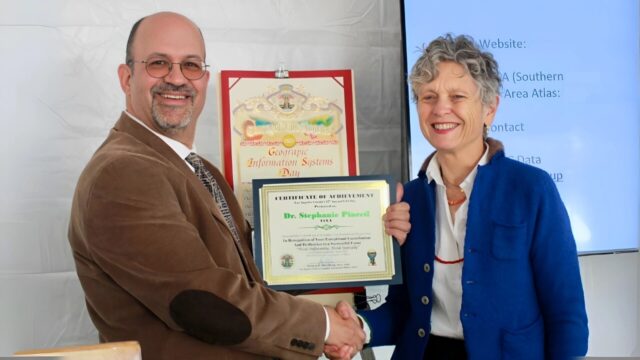
Stephanie Pincetl wins UCLA 2025 Public Impact Research Award
The award highlights faculty whose research has demonstrably improved lives locally, nationally and globally


The award highlights faculty whose research has demonstrably improved lives locally, nationally and globally

A closer look at the decisions, data and trade-offs behind LA’s plan to reach 100% renewable energy by 2035 — without leaving vulnerable communities behind

What if the key to solving climate change is hidden in the data we already have? Stephanie Pincetl believes the answer lies in connecting the dots.

New UCLA study finds most California homes can easily electrify without costly panel upgrades, thanks to strategic load management.
NEWS
Headline
UCLA IoES Professor Stephanie Pincetl discusses Los Angeles’ rebuilding efforts after the devastating wildfires for The Economist, asserting that the city should use this moment to address its housing crisis…
Blog
CCSC hosted a workshop "Mapping the Conversation on Faith, Flourishing, and the Environment," to discuss the conversation between faith and the environment and chart a direction for where the conversations need to go, including critical theoretical work (part historical, part synthetic), and also the empirical work needed for better understanding.
Headline
As Greece attempts to recover from the recent destructive wildfires around Athens, Southern Californians facing our own heat wave should take note of the pattern that enabled them. It should be well-known by now: sprawl into the urban-wildland interface where development collides with nature, the corresponding replacement of grass, shrubs and other plants native to the area with many more trees for shade, then strain on the land thanks to drought, record high heat and wind, intensified by climate change. The conditions that led to the worst wildfires in Greece this year, burning 156 square miles, damaging more than 100 homes and causing at least one death, apply in Los Angeles too.
Announcements
The California Public Utilities Commission has selected the California Center for Sustainable Communities and the Los Angeles Regional Collaborative at UCLA IoES to lead a Data Working Group on Distributed…
Announcements
Last year, as part of the study, the UCLA Luskin Center for Innovation (LCI) and colleagues provided LADWP with recommendations for robust, long-term solutions to low-income customers’ ability to pay their bills through the clean energy transition. Now, in partnership with the UCLA California Center for Sustainable Communities, our researchers are digging deeper into energy equity issues to guide the agency’s development, implementation, and evaluation of these recommendations. “LADWP has the opportunity to lead the nation in how to achieve a more just energy transition,” said Stephanie Pincetl, director of the UCLA California Center for Sustainable Communities, “and we are honored to help facilitate that possibility.”
Headline
UCLA’s Stephanie Pincetl says expanding the San Gabriel Mountains National Monument should go hand in hand with better local access to green space — so LA’s residents can enjoy nature without overcrowding the mountains.